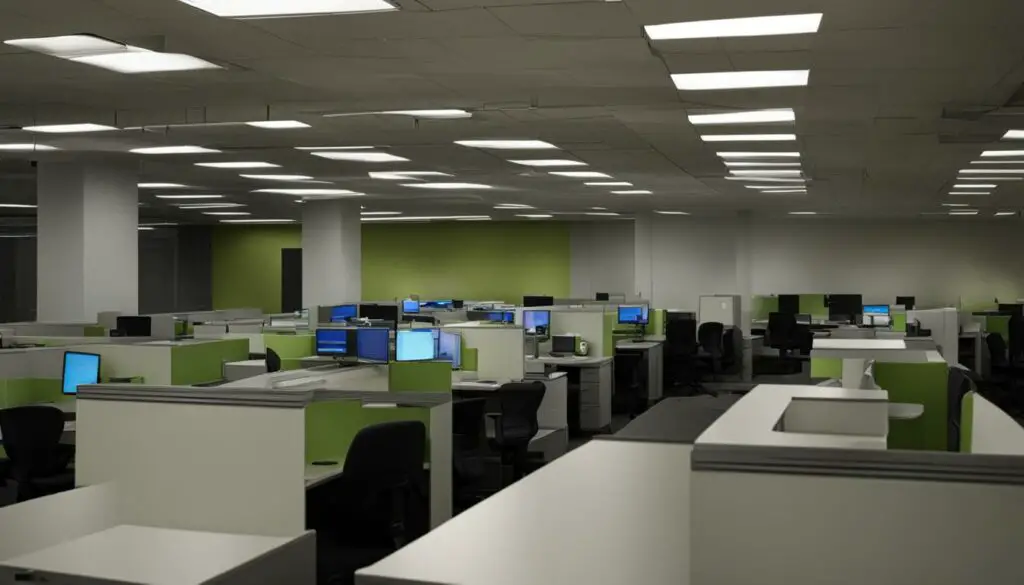Open office plans have become increasingly popular in recent years, with many companies adopting this layout as a way to promote collaboration and communication among employees. However, from a feng shui perspective, open office plans can have negative impacts on the energy and productivity in the workplace.
While open offices have their advantages, such as promoting teamwork and easy communication, the disadvantages cannot be ignored. Noise levels, lack of privacy, and constant visual distractions can disrupt the harmony and balance in the workspace, leading to decreased productivity and increased stress levels.
In this article, we will explore the specific problems that open office plans can pose from a feng shui perspective. We will also discuss how these issues can be addressed to create a more balanced and productive work environment, while still maintaining the benefits of an open office layout.
Key Takeaways:
- Open office plans can have negative impacts on feng shui in the workplace.
- Noise levels, lack of privacy, and constant visual distractions can disrupt productivity and increase stress levels.
- Addressing these issues can create a more balanced and productive work environment.
Understanding Feng Shui in the Workplace
When it comes to creating a productive and harmonious work environment, feng shui principles can play a significant role. Feng shui is an ancient Chinese practice that focuses on creating a balanced and positive flow of energy, or qi, in a space. By incorporating these principles into the workplace, employers can improve employee well-being, reduce stress, and enhance overall productivity.
Improving office space energy through feng shui involves paying attention to the physical layout and design of the workspace. Some key principles include:
- Creating an open and clutter-free environment to allow for the free flow of energy.
- Positioning desks and chairs in a way that promotes a clear line of sight and fosters good communication.
- Bringing in natural light and greenery to promote a sense of calm and well-being.
Overall, incorporating feng shui principles in the workplace can help to create a more balanced and positive atmosphere, which can improve employee satisfaction, motivation, and productivity.

Disrupting Harmony: The Problems with Open Office Plans
Open office plans have become increasingly popular in recent years, but they come with their fair share of disadvantages. From a feng shui perspective, the design of open offices can negatively impact the overall energy and productivity in the workplace. Let’s explore some of the specific problems that open office plans can pose:
Noise
One of the most significant complaints about open office plans is the increase in noise levels. With little to no barriers between employees, conversations and phone calls can be overheard and distracting. This can lead to decreased focus and productivity, ultimately leading to negative effects on employee well-being and job satisfaction.
Lack of Privacy
Open office plans also lack privacy, which can be particularly challenging for employees who need to focus on independent work or confidential projects. The constant visual distractions and lack of personal space can lead to increased stress and anxiety, ultimately making it harder to concentrate and be productive.
Visual Distractions
Visual distractions are another issue with open office plans, as the lack of physical barriers can lead to employees being exposed to increased movement, clutter, and other visual stimuli. This can be overwhelming and difficult to avoid, ultimately leading to decreased productivity and reduced overall well-being.

“Open-plan offices were devised by Satan in the deepest caverns of Hell.” – Lucy Kellaway, Financial Times
While there are certainly some benefits to open office plans, it’s important to consider the negative impacts they can have on workplace feng shui. The lack of privacy, increased noise levels, and constant visual distractions can disrupt the harmony and balance in the workspace, ultimately leading to decreased productivity and employee well-being. In the next section, we will explore how open office plans can hinder the flow of positive energy, also known as qi, in the workplace.
Blocked Energy Flow: How Open Office Plans Hinder Qi
In traditional feng shui, the concept of qi refers to positive energy flow. When designing an office space, it is important to promote the movement of energy to create a harmonious environment. However, open office plans can hinder qi by creating blockages and stagnant energy.
The layout and design of open offices can create obstacles to the flow of qi. For example, large open spaces without any dividers can disrupt the natural flow of energy. In addition, the excessive use of straight lines and sharp edges can create negative energy and blockages. This can lead to mental fatigue, stress and even physical discomfort.
Moreover, noise and visual distractions in open office plans can lead to fatigue and decreased productivity. The constant movement of people, lack of privacy, and distracting sounds can create a chaotic atmosphere that further disrupts the natural flow of energy.
In order to improve qi flow in open office plans, it’s important to incorporate feng shui principles into the office space. Adding elements such as plants, water features, and natural lighting can help to promote a positive energy flow.
Another way to improve the flow of positive energy is to create designated areas for different work functions. For example, areas for socializing, brainstorming and private work can be created using dividers or furniture placement to ensure a more efficient and effective use of space.

By paying attention to the flow of energy and incorporating feng shui principles, it’s possible to create a more harmonious and productive open office space.
Decreased Productivity: The Impact of Open Office Plans
Open office plans have become increasingly common in modern workplaces, but they can come with significant disadvantages. The lack of privacy, increased noise levels, and constant visual distractions can all contribute to decreased productivity levels among employees.
Studies have shown that open office plans can reduce productivity by up to 15%, with distractions being the primary culprit. Noise levels from nearby conversations, phone calls, and office equipment can make it difficult for employees to focus on their tasks and concentrate for extended periods.
The lack of privacy in open office plans can also be a significant hindrance to productivity. With no walls or partitions between workstations, employees may feel uncomfortable making phone calls or having sensitive conversations with coworkers nearby. This can lead to delays in communication and decision-making processes, ultimately affecting overall productivity levels.
Visual distractions can also be a problem in open office plans. With no physical barriers, employees may find themselves constantly distracted by movement or activity nearby, making it harder to stay on track with their work.
To counteract these negative effects, companies should consider implementing effective strategies to promote productivity in open office plans. This may include providing designated quiet areas for employees to work in, utilizing sound-absorbing materials, and encouraging effective communication and collaboration.

By addressing these concerns and creating a more productive work environment, companies can help ensure that employees are able to work efficiently and effectively, while maintaining a healthy work-life balance.
Creating a Balanced Work Environment: Feng Shui Tips for Open Offices
Open office plans can be a challenge for feng shui enthusiasts, but there are ways to optimize these spaces while promoting balance and harmony. Here are some feng shui tips for enhancing the office atmosphere:
- Optimize the flow of energy: Position desks in a way that allows for a clear view of the entrance to the office, but avoid direct alignment with the doorway. Use natural dividers, such as plants or bookshelves, to help direct energy flow throughout the workspace.
- Incorporate natural elements: Bring plants, natural light, and other natural elements into the office to promote a calming atmosphere. A water feature, such as a small fountain, can also help to promote positive energy flow.
- Create designated areas: Dedicate specific spaces for different work functions, such as collaborative areas and quiet zones. This helps to promote balance and harmony in the workspace.
By implementing these feng shui tips, open office plans can be designed to promote a more balanced and productive work environment. Remember, the key is to optimize the flow of energy and promote balance and harmony in the workspace.

The Connection Between Office Design and Employee Well-being
The design of an office can directly affect an employee’s well-being. Research has shown that a well-designed workspace can lead to improved mental health, reduced stress, and increased job satisfaction and performance.
When it comes to enhancing office atmosphere and promoting employee well-being, there are several key design elements to consider:
Lighting
Lighting is a crucial element in creating a positive and energizing work environment. Natural light is ideal, but if that is not possible, it is essential to have a good artificial lighting system. Avoid harsh fluorescent lighting and opt for warmer, softer tones, which can have a calming effect and help reduce eye strain and fatigue.
Color Schemes
The colors used in an office can also have an impact on employee well-being. Blue and green hues are known to promote calmness and focus, while brighter colors like yellow and orange can be energizing and boost creativity. However, it’s important to strike a balance and avoid overwhelming employees with too much bright or bold color.
Desk Arrangement
The way desks are arranged in an office can also affect employee well-being. It’s essential to provide ample space and create a layout that allows for both privacy and collaboration. Consider implementing adjustable desks that allow employees to switch between sitting and standing, which can improve circulation and reduce the risk of health problems associated with prolonged sitting.
By incorporating these design elements and considering employee well-being in office design, you can promote a positive and productive work environment that benefits both the employees and the company.

Overcoming the Challenges: Strategies for a More Productive Open Office
Open office plans have become increasingly popular in recent years, but they can pose a number of challenges that hinder productivity in the workplace. However, with some strategic design choices and policies, you can create a more balanced and productive open office environment.
Implement Quiet Zones
One of the main disadvantages of open office plans is the lack of privacy and constant noise distractions, which can lead to decreased productivity. By creating designated quiet zones within the office space, employees can have a quiet space to focus on their work without distraction. These zones can be enclosed conference rooms or simply designated areas with soundproof dividers.
Utilize Sound-Absorbing Materials
Another way to combat noise distractions is to incorporate sound-absorbing materials into the office design. This can include acoustical panels, carpets, and furniture with noise-reducing properties. By reducing the amount of noise in the office space, you can create a more peaceful and productive environment.
Encourage Effective Communication and Collaboration
While open office plans can sometimes lead to overstimulation and distractions, they can also foster collaboration and creativity among employees. To make the most of this benefit, it’s important to encourage effective communication and collaboration. Consider implementing policies such as regular brainstorming sessions or team-building activities to promote collaboration while minimizing distractions.
Creating a Balanced Work Environment
Ultimately, the key to overcoming the challenges posed by open office plans is to create a balanced work environment. By incorporating feng shui principles such as optimized energy flow, natural elements, and designated work areas, you can promote balance and harmony in the workplace. This can lead to increased employee well-being and productivity.

By implementing these strategies and incorporating feng shui principles into your open office design, you can overcome the negative effects of open office plans and create a more productive and harmonious workplace.
Enhancing Office Atmosphere: Incorporating Feng Shui Principles
Creating a positive and harmonious work environment is essential for promoting productivity and employee well-being. By incorporating feng shui principles, you can enhance the office atmosphere and create a balanced workspace.
The Importance of Lighting
Lighting plays a crucial role in feng shui and can have a significant impact on the energy in the office space. Natural light is the best source of light and can help promote positive energy flow. If natural light is not available, consider incorporating full-spectrum lighting, which mimics natural light. Avoid harsh or fluorescent lighting, which can create a stressful environment.
Color Schemes
Color can also impact the energy in the office space. Consider using colors that promote calmness, focus, and creativity. Blue is known for promoting tranquility and communication, while green is associated with growth and balance. Yellow can stimulate creativity, and orange can create a sense of warmth and comfort.
Desk Arrangement
The arrangement of desks can also impact the energy in the office space. Avoid placing desks in a straight line or facing a wall, as this can create stagnant energy. Instead, position desks in a way that allows for open communication and collaboration while also promoting privacy and focus.

Plants and Natural Elements
Incorporating plants and natural elements into the office space can help promote positive energy flow and enhance the overall atmosphere. Plants are known for their air-purifying properties and can create a sense of calm and well-being. Decorate the office using natural materials such as wood, stone, and water to promote balance and harmony.
By incorporating these feng shui principles into your office space, you can create a balanced and harmonious work environment that promotes productivity and well-being.
Conclusion
In conclusion, open office plans can have negative impacts on feng shui, employee well-being, and overall productivity. The lack of privacy, increased noise levels, and constant visual distractions can disrupt the harmony and balance in the workspace, hindering the flow of positive energy, also known as qi. This can ultimately lead to decreased focus and efficiency in work tasks, negatively affecting overall productivity levels.
However, by incorporating feng shui principles and effective office design strategies, it is possible to enhance the overall office atmosphere and create a more balanced and productive workspace. This includes optimizing the flow of energy, incorporating natural elements, and creating designated areas for different work functions.
It is important to remember that office design plays a crucial role in promoting employee well-being and enhancing overall job satisfaction and performance. Therefore, it is essential to take into account the negative effects of open office plans and implement practical solutions to overcome these challenges and create a more harmonious and positive working environment.
FAQ
Why are open office plans considered bad feng shui?
Open office plans are considered bad feng shui because they can disrupt the harmony and balance in the workplace. The lack of privacy, increased noise levels, and constant visual distractions can negatively impact the overall energy and productivity in the office.
What is the importance of feng shui in the workplace?
Feng shui in the workplace is important because it helps create a balanced work environment. By optimizing the flow of energy and incorporating natural elements, feng shui can enhance employee well-being and productivity in the office space.
What specific problems do open office plans pose from a feng shui perspective?
From a feng shui perspective, open office plans can pose problems such as lack of privacy, increased noise levels, and constant visual distractions. These factors disrupt the harmony and balance in the workspace, affecting overall energy and productivity.
How do open office plans hinder the flow of positive energy (qi)?
Open office plans hinder the flow of positive energy, or qi, by creating blockages and stagnant energy. The layout and design of open offices can contribute to these blockages, negatively impacting the overall atmosphere and productivity in the workplace.
What impact do open office plans have on employee productivity?
Open office plans can have a direct impact on employee productivity. Factors such as noise, distractions, and lack of privacy can lead to decreased focus and efficiency in work tasks, ultimately affecting overall productivity levels.
Are there any feng shui tips for creating a balanced work environment in open offices?
Yes, there are feng shui tips that can help create a balanced work environment in open offices. These include optimizing the flow of energy, incorporating natural elements, and creating designated areas for different work functions to promote balance and harmony.
What is the connection between office design and employee well-being?
There is a strong connection between office design and employee well-being. A well-designed workspace can positively impact mental health, reduce stress, and enhance overall job satisfaction and performance.
How can we overcome the challenges of open office plans and improve productivity?
To overcome the challenges posed by open office plans and improve productivity, strategies such as implementing quiet zones, utilizing sound-absorbing materials, and encouraging effective communication and collaboration can be employed.
How can feng shui principles be incorporated to enhance the office atmosphere?
Feng shui principles can be incorporated to enhance the office atmosphere in various ways. These include considering lighting, color schemes, and desk arrangement to create a more harmonious and positive working environment.
What are the key points to remember about open office plans, feng shui, and office design?
It is important to remember that open office plans can have negative impacts on feng shui and employee well-being. Office design plays a crucial role in creating a balanced and productive workspace, and incorporating feng shui principles can further enhance the overall atmosphere in the office.

